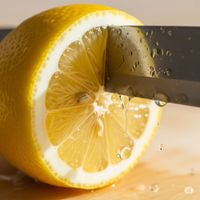The Surprising Power of the Humble Lemon

Our daily routines, from cleaning countertops to washing our faces, are often filled with synthetic chemicals and unpronounceable ingredients. It’s only natural to wonder if there’s a better, more transparent way. At BioActiv8, we believe the answer has been here all along, hiding in plain sight in your fruit bowl.
It's the humble lemon. We see it as a garnish for drinks or a zesty addition to food, but this vibrant fruit is a veritable toolkit of powerful bioactive compounds. Let's explore the science behind what makes a lemon so much more than a pretty wedge.
The Anatomy of a Superfruit: Deconstructing the Lemon
To understand the lemon's power, we need to look at its individual parts. Each section offers a unique set of active ingredients that can be harnessed for different purposes.
The Juice & Pulp: A Citric Acid Reservoir
This is the heart of the lemon's utility. The sharp, tart taste of lemon juice comes from its high concentration of citric acid, a natural alpha-hydroxy acid (AHA) that is the star of many cleaning and skincare applications.
The Peel (Zest): Aromatic & Potent
The bright yellow peel isn't just for decoration. It's rich in volatile essential oils, with the most famous compound being limonene. Limonene is responsible for the characteristic citrus scent and possesses powerful solvent properties, making it excellent for cutting through grease and grime.
The Seeds: Small but Mighty
While less commonly used in home applications, lemon seeds contain their own beneficial compounds, including oils and bitter principles like limonin. In commercial applications, these can be extracted for various uses.
Citric Acid: The Multipurpose Marvel
Citric acid is one of nature's most versatile compounds. Its chemical properties make it incredibly effective in a wide range of applications.
For Your Home: A Natural Cleaning Powerhouse
The low pH of citric acid makes it a fantastic, non-toxic cleaner.
- Natural Descaler: It chemically breaks down and dissolves mineral deposits like limescale from kettles, taps, and showerheads.
- Effective Degreaser: It cuts through soap scum and kitchen grease with ease.
- Mild Disinfectant: Its acidity creates an environment where many common bacteria and moulds cannot survive.
BioActiv8 Tip: DIY All-Purpose Lemon Cleaner
Want to put it into practice? It's incredibly simple.
- Ingredients:
- Juice of 1 lemon
- 1 part white vinegar
- 1 part water
- Instructions:
- Combine in a spray bottle and shake well. It's perfect for countertops, sinks, and cutting boards (let it sit for a few minutes on a cutting board to help disinfect). Avoid using on natural stone like marble or granite, as the acid can cause damage.
For Your Skin: A pH-Balancing Superstar
The cosmetic industry has long recognised the benefits of citric acid.
- pH Balancer: Many skincare products are too alkaline, which can disrupt the skin's natural protective barrier (the "acid mantle"). Citric acid is used to adjust the formula's pH to a more skin-friendly level.
- Exfoliant: As an AHA, it helps to dissolve the bonds holding dead skin cells to the surface, revealing brighter, smoother skin underneath.
- Antioxidant: It can help to neutralise damaging free radicals caused by environmental stressors.
For Your Food: The Original Preservative
Long before we had complex additives, we had lemons. A squeeze of lemon juice on sliced apples or avocados prevents them from browning. This is citric acid at work, inhibiting the oxidation process that causes discolouration.
Limonene: The Aromatic Defender
Found in the peel, limonene is more than just a pleasant scent.
- Powerful Solvent: It's fantastic at dissolving oils and sticky residues. Think of it as nature's goo-remover. This property, combined with its fresh smell, makes it a popular ingredient in many commercial and natural cleaning products.
- A Note on Sensitivity: At BioActiv8, transparency is key. While limonene is a natural compound, it is also a known allergen for some individuals when exposed to air (oxidised). This doesn't make it "bad"—it's simply a fact of its chemistry, and a reminder that "natural" doesn't always mean "non-reactive" for everyone.
Nature vs. The Lab: The Synthetic Story
If citric acid from lemons is so effective, why don't all companies use it? The answer lies in scale and cost.
The citric acid you find listed as a food additive—often labelled with the E-number E330—is not squeezed from billions of lemons. It is produced on an industrial scale through a process of fermentation. A specific type of mould, Aspergillus niger, is fed a sugary solution (like corn molasses), and through its metabolic process, it produces citric acid.
While this synthetic version is chemically identical to the one found in lemons, it's an isolated compound produced in a lab. Using a whole lemon provides this powerful acid in its natural context, alongside vitamins, minerals, and other phytonutrients.
Conclusion: A New Respect for an Old Friend
The journey from a simple fruit to a powerful active compound is a perfect example of the BioActiv8 mission. It’s about looking closer at nature and understanding the science that makes it work.
So the next time you hold a lemon, we hope you see more than just a fruit. You see a descaler, a degreaser, a skin-balancer, and a preservative. You see a powerhouse of natural chemistry, waiting to be unlocked for a healthier, more transparent lifestyle.